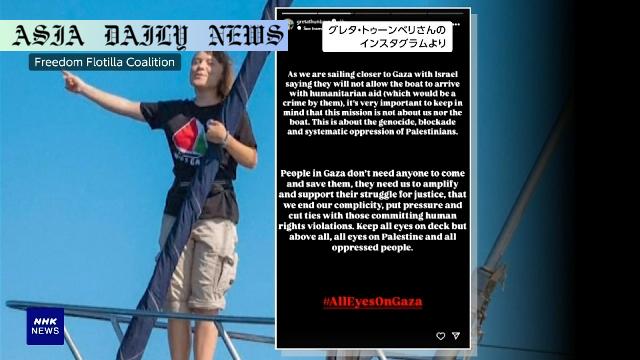Gaza: Israeli Defense Minister orders military to stop Greta Thunberg’s humanitarian boat from reaching Gaza.

Israel’s Firm Stance Against Gaza-Bound Humanitarian Efforts
On Sunday, Israel’s Defense Minister Israel Katz took decisive action by directing the military forces to prevent a boat carrying Swedish environmental activist Greta Thunberg and other human rights advocates from reaching the Gaza Strip. The boat, operated by a human rights organization, was carrying vital humanitarian supplies, including food and medical aid, for the besieged Palestinian enclave. Katz issued a clear statement, emphasizing, “I instructed the IDF to act so that the Madleen flotilla does not reach Gaza.” This directive comes amid Israel’s long-standing blockade of Gaza’s waters.
The vessel’s mission underscores a combination of environmental advocacy and humanitarian assistance. On her social media, Thunberg stated, “We are sailing closer to Gaza with Israel saying they will not allow the boat to arrive with humanitarian aid.” She urged global attention on the plight of Palestine and other oppressed populations, emphasizing that peaceful efforts like this mission deserve widespread visibility and support. Despite the urgency of the delivery, Israeli forces remained steadfast in their denial of access, citing security concerns and ongoing regional tensions.
Humanitarian Desperation and Ongoing Conflict
The Gaza Strip has long faced a dire humanitarian situation exacerbated by ongoing blockades and prolonged conflicts. This incident adds another layer of distress to the daily challenges faced by the Palestinian population. A member of the European Parliament aboard the vessel publicly voiced concerns, warning that they faced the risk of being “illegally detained” by Israeli forces. This statement highlights the complexities surrounding international aid delivery to restricted areas like Gaza.
Meanwhile, the region continues to endure devastating attacks. According to Palestinian media, an Israeli strike on Sunday led to the tragic loss of 13 lives near a food distribution center run by a US-led foundation. Such incidents further solidify the urgency of humanitarian efforts, drawing attention to the lack of resources and food security in Gaza. However, the blockade remains a contentious issue, with Israeli authorities firmly justifying their actions as necessary measures for national security.
Global Advocacy Meets Geopolitical Challenges
Greta Thunberg’s presence aboard the humanitarian vessel symbolizes a fusion of environmental advocacy and global justice movements. Her involvement in the mission aimed to draw attention to the interconnectedness of social, environmental, and political issues. Thunberg’s appeal to her followers showcased a growing trend where young voices resonate powerfully in geopolitical conflicts. Her plea to “keep all eyes on Palestine and all oppressed people” echoes the sentiments of many committed to addressing unjust power dynamics across the world.
The situation also raises critical questions about the boundaries of international law, humanitarian access, and the role of activism in conflict zones. As the vessel edges closer to the shores of Gaza, the international community remains divided—some advocate for more robust humanitarian interventions, while others side with Israel’s entrenched position citing security implications. This event, while tragic in its developments, paints a vivid picture of the complex interplay between aid and politics in war-torn regions.
Broader Implications for International Aid
This blockade serves as a stark reminder of the hurdles many humanitarian missions face when attempting to access those most in need. The plight of Gaza has, for years, represented a grim juxtaposition of global advocacy and geopolitical resistance. While the blockade is viewed by Israeli authorities as essential for maintaining national security, it results in severe restrictions on vital resources for Gaza’s impoverished populations.
With Greta Thunberg’s involvement elevating the narrative on global platforms, this confrontation could prompt broader scrutiny of Israeli policies and the ethics of imposing such stringent blockades. On the other hand, Israeli officials continue justifying these actions under the umbrella of countering potential threats. Ultimately, only a diplomatic breakthrough seems capable of reconciling the confrontations between humanitarian missions and regional politics.
Commentary
Insights on Israel’s Response to Gaza Aid
The decision by Israel to intercept the Gaza-bound boat carrying Greta Thunberg and humanitarian supplies reflects the ongoing complexity of the region’s geopolitical tensions. While Israel justifies its actions based on national security concerns and the blockade of Gaza’s waters, this decision also highlights the broader challenges historically associated with the region’s humanitarian crises. Sadly, the suffering of civilians often falls into the shadows as competing narratives vie for global attention.
The Role of Activism in Geopolitical Conflicts
Greta Thunberg, a globally recognizable figure in the fight against climate change, has expanded her platform by addressing humanitarian and socio-political injustices. Her involvement in this mission underscores the evolving role of activists in major global conflicts. By navigating the borders of environmental and human rights issues, Thunberg emphasizes the interconnected nature of these challenges. This spotlight raises awareness not only on climatic concerns but also on issues of equitable living conditions, food security, and access to healthcare.
Challenges Ahead for Humanitarian Work
Efforts to deliver aid to Gaza encapsulate the complex balance between respecting sovereignty and responding to basic human needs. International organizations and activists consistently face setbacks when trying to provide humanitarian support to highly restricted areas like Gaza. This recent incident serves as a reminder of the urgent need for dialogue and cooperation between Israel, Palestine, and the broader international community to ensure that human rights and security can co-exist. Ultimately, as such tensions persist, strategies to deliver critical aid in crisis zones need to evolve, ensuring lives are protected and basic needs are met.


